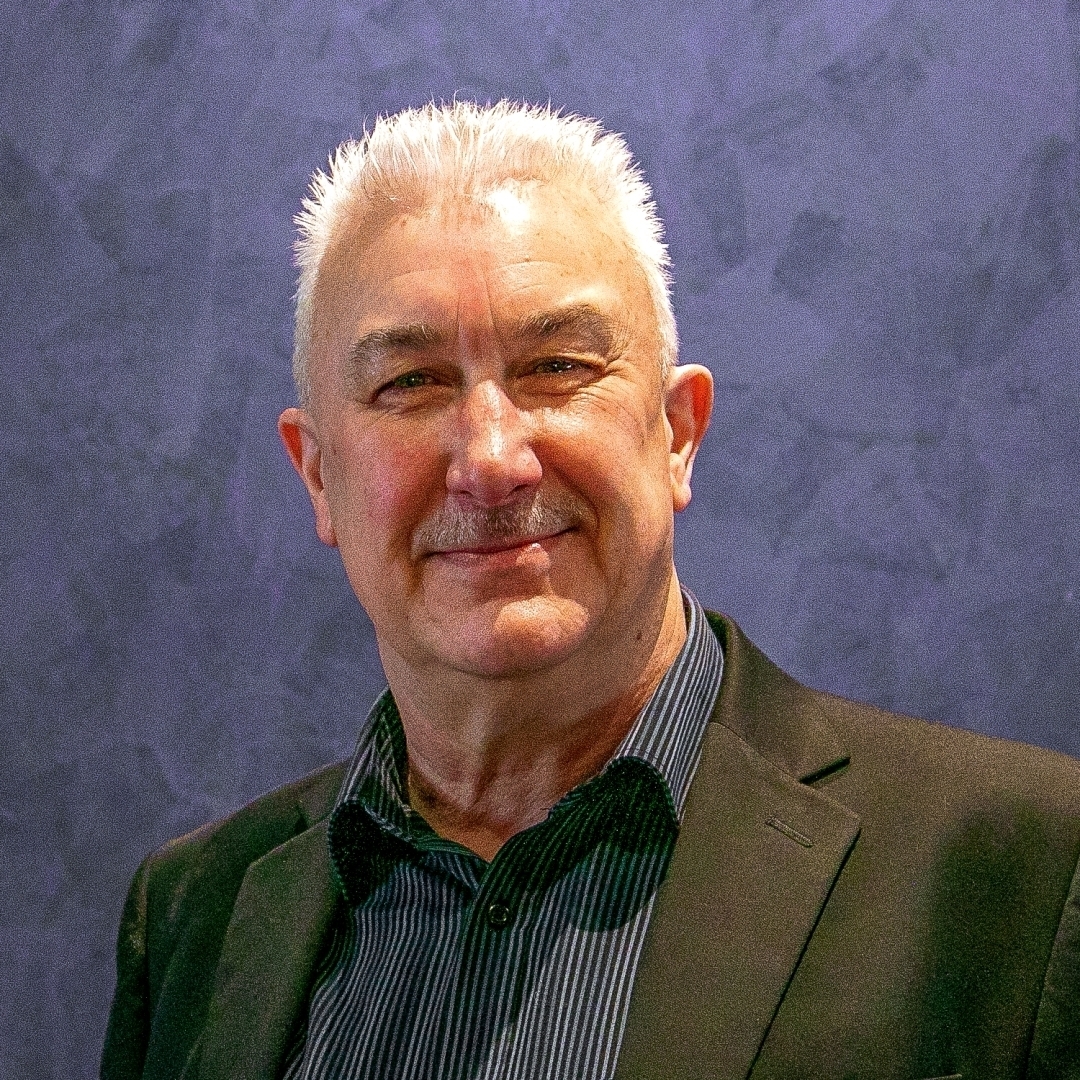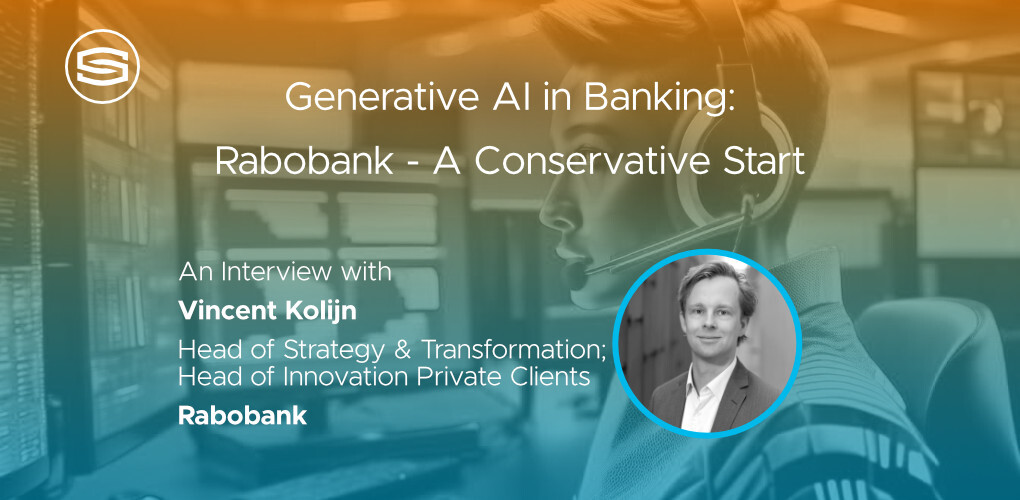
Insights & Opinions
Generative AI in Banking: Rabobank - A Conservative Start
Fri, 21 Jun 2024


In a surprising turn of events, the first question I asked Vincent Kolijn, Head of Strategy & Transformation, Head of Innovation Private Clients at Rabobank, was turned back on me!
I had just begun the interview by asking where Rabobank was on their journey of Generative AI use and Vincent asked me to explain what I meant by the term “Generative AI”, just to make sure that we weren’t talking at cross purposes.
It was a valid question and he wasn’t being pedantic.
In the research brief that I provide all interview prospects beforehand, I use the term “Generative AI” without actually defining what I mean by it and his question made me realise that I have never explained my own use of the term at any point in this series so far.
For the purpose of these interviews and the white paper that will follow, it’s not important whether my use of the term is technically correct or comprehensive, but what IS important is that it is consistently applied across the research!
So, with apologies to all of you that have been following so far, here is the way that I classify the different applications of AI:
- Analytical AI – analysing data to extract insights, make predictions, or identify patterns. This includes technologies like data mining, machine learning models for predictive analytics, and statistical analysis tools that are often broadly grouped under the umbrella of “data science”.
- Decision-making AI – the systems that execute tasks or make autonomous decisions based on the predefined rules, data and scenarios they process. This is often seen in areas like robotics, autonomous vehicles, and automated trading systems.
- Generative AI - technology that can create content, such as text, images, music, and other media, in a manner similar to the way a human would. It uses deep learning models and large amounts of data to learn how to produce outputs that mimic real-world examples. This branch of AI is distinguished by its ability to generate new data points (content) from the patterns it has learned in the training data.
In my understanding, the fundamental difference between Generative AI and what has come before is its creative capacity and ability to “act like” a human assistant, which sets it apart from other AI forms that primarily process and analyse data without creating fundamentally new content.
With that clarification, we continued the interview.
The Conservative Start: A Strategic Pause
Rabobank's journey into generative AI began with a significant pause - a moratorium declared by the IT and risk departments about a year ago on all AI activities. This decision stemmed from the uncertainties surrounding the new technology's risks and was required to enable the relevant departments to make an assessment. This led to the formation of a steering committee dedicated to defining AI types, potential use cases, and exploring safe experimental avenues within the bank's risk appetite.
Incremental Steps Forward
After extensive deliberations, Rabobank has initiated a few controlled experiments with generative AI, primarily focusing on internal applications to enhance employee productivity and decision-making processes. One such tool is a "co-pilot solution" from Microsoft, which assists in summarising meetings and functions somewhat like an enhanced search engine for internal use. "It will help you to summarise a meeting...it also functions as a sort of Bing or Google search engine but on steroids," said Vincent.
This cautious foray serves multiple purposes: familiarising staff with AI capabilities, integrating AI within the bank's operational fabric, and ensuring that any AI deployment aligns with the stringent regulatory landscape and the bank's conservative risk profile.
Potential High-Impact Use Cases
Despite the cautious approach, Vincent acknowledges significant areas where generative AI could revolutionise Rabobank’s operations. One promising application is within customer service centres, where AI can listen to conversations and generate summaries, especially in regulated contexts requiring documentation, like insurance onboarding. "This co-pilot listens in on the conversations and helps them to make a real-life summary of the conversation," he explains. This not only streamlines the process but also significantly reduces the manual labour involved in documenting these interactions.
Another area with high potential is KYC (Know Your Customer) processes, where AI could dramatically enhance efficiency and accuracy. The Dutch legislation, however, has not yet evolved to fully endorse AI applications in this domain, reflecting a broader caution that could hinder progress.
Vincent sees this as a missed opportunity, especially given the heavy regulatory burden in areas like anti-money laundering (AML) and KYC, where AI could significantly reduce operational costs and improve service delivery. I discovered an astonishing statistic in a recent article stating that anti-money laundering operations costs one in every eight Euros earned! This is an area ripe for transformation and it is clear to see the benefits that AI could bring to both the banks and the clients, who currently have to put up with regular questioning by the bank.
Investment modelling and advice is also an area that Vincent identifies as being a prime future candidate for AI deployment. Robo-advisory services are well established in some parts of the world and it’s definitely the direction the industry is moving in as AI modelling begins to significantly outperform human analysts.
Navigating Challenges: Regulation and Innovation
The discussion with Vincent also highlighted a critical tension between innovation and regulation. The slow pace of regulatory approval for new AI applications poses a risk, potentially leaving the established and more risk averse banks behind their more agile competitors. "I can imagine that fintechs and neobanks will progress much faster with implementing this new technology," he noted, expressing concern over the industry’s pace of innovation compared to newcomers that might adopt AI more aggressively.
Vincent went on to make the point that fraudsters don’t have to comply with regulation and that Generative AI in particular provided new opportunities for fraudsters, while the banks have to combat this with their hands tied behind their back!
Employee Engagement and Organisational Culture
Vincent revealed that in spite of the initial moratorium, there is an undercurrent of enthusiasm among employees about AI's potential. This enthusiasm leads to grassroots-level experimentation, albeit in an unstructured and often under-the-radar manner. This scenario underscores a significant cultural aspect of AI integration - balancing control and innovation within a large organisation.
The Road Ahead
As Rabobank continues to explore generative AI, the focus remains on expanding its use responsibly and effectively. The bank's journey reflects a broader industry trend where financial institutions must navigate the complexities of technological adoption amid regulatory uncertainties and ethical considerations.
In conclusion, Vincent Kolijn's insights offer a compelling look at how traditional banks are cautiously yet optimistically engaging with generative AI. While the path forward is fraught with challenges, the potential benefits in efficiency, customer satisfaction, and competitive advantage are too significant to ignore. As the regulatory environment evolves and banks become more comfortable with AI's capabilities, we can expect more robust and innovative applications of generative AI in the banking sector.
(Download our white paper "Generative AI in Benelux Banking: Opportunities, Challenges and Future Outlook" for a consolidated collection of insights shared by Benelux bankers across 1:1 interviews, keynotes, panels and executive round tables we hosted.)



